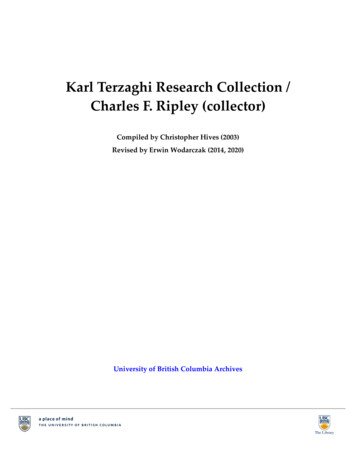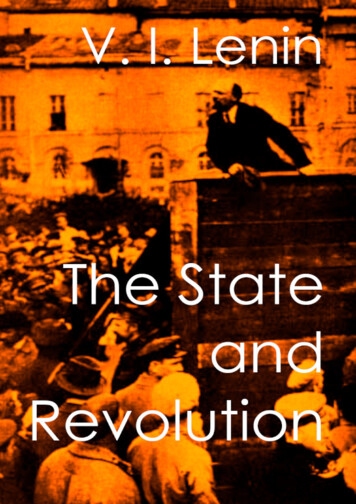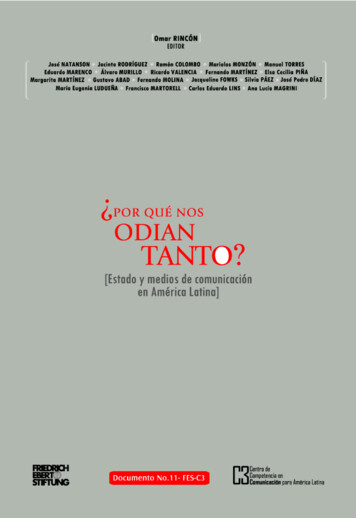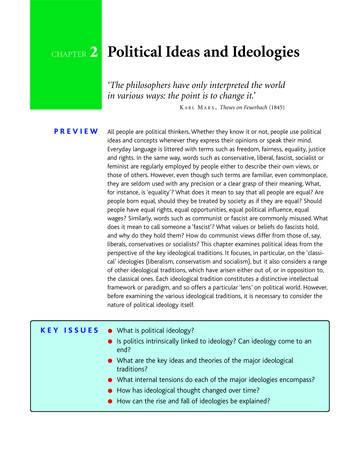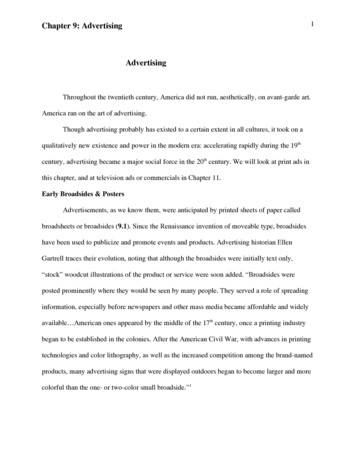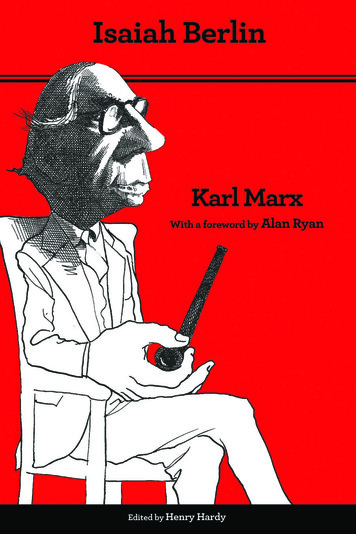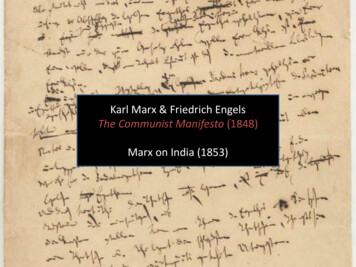
Transcription
Karl Marx & Friedrich EngelsThe Communist Manifesto (1848)Marx on India (1853)
The history of hitherto existing society is the history of classstruggles- Marx and Engels, The Communist Manifesto
Karl Marx (1818-1883)Friedrich Engels (1820-1895)
‘The philosophers have only interpreted the world, invarious ways; the point is to change it’- Marx ‘Theses on Feuerbach’
‘Marx’s life exemplified his ideal of internationalism, for by theend he was neither German nor British, but a European or even aglobal intellectual’- Kevin Anderson, Marx at the Margins, 4.
I forsook the company and the dinner-parties, the port-wineand champagne of the middle classes, and devoted myleisure-hours almost exclusively to intercourse with plainworking men
Such are the various working-people's quarters of Manchester as I had occasion toobserve them personally during twenty months. If we briefly formulate the result of ourwanderings, we must admit that 350,000 working-people of Manchester and its environslive, almost all of them, in wretched, damp, filthy cottages, that the streets whichsurround them are usually in the most miserable and filthy condition, laid out withoutthe slightest reference to ventilation, with reference solely to the profit secured by thecontractor. In a word, we must confess that in the working-men's dwellings ofManchester, no cleanliness, no convenience, and consequently no comfortable family lifeis possible; that in such dwellings only a physically degenerate race, robbed of allhumanity, degraded, reduced morally and physically to bestiality, could feel comfortableand at home.- Engels, The Conditions of the Working Class in England
ENGLAND IN 1819An old, mad, blind, despised, and dying king,-Princes, the dregs of their dull race, who flowThrough public scorn, mud from a muddy spring,-Rulers who neither see, nor feel, nor know,But leech-like to their fainting country cling,Till they drop, blind in blood, without a blow,-A people starved and stabbed in the untilled field,-An army which liberticide and preyMakes as a two-edged sword to all who wield,-Golden and sanguine laws which tempt and slay;Religion Christless, Godless, a book sealed,-A Senate—Time's worst statute unrepealed,-Are graves from which a glorious Phantom mayBurst to illumine our tempestuous day.- Percy Shelly
‘What I have seen has disgusted and astonished me beyond all measure’- Charles Dickens
The history of the proletariat in England begins with the secondhalf of the last century, with the invention of the steam-engineand of machinery for working cotton. These inventions gaverise, as is well known, to an industrial revolution, a revolutionwhich altered the whole civil society; one, the historicalimportance of which is only now beginning to be recognised.England is the classic soil of this transformation, which was allthe mightier, the more silently it proceeded; and England is,therefore, the classic land of its chief product also, theproletariat. Only in England can the proletariat be studied in allits relations and from all sides.- Engels, The Conditions of the Working Class in England
British Empire in 1886
Steam has brought India into regular and rapidcommunication with Europe, has connected itschief ports with those of the whole southeastern ocean and has revindicated it from theisolated position which was the prime law ofits stagnation. The day is no far distant, whenby a combination of railways and steamvessels, the distance between England andIndia, measured by time, will be shortened toeight days, and when that once fabulouscountry will thus be actually annexed to theWestern world.- Marx ‘British Rule in India’
CAPITAL (1867-1894)1867First German edition1873Second German edition – with significant revisions1872-1875French editiontranslated on the basis of German edition (1873) andheavily edited by Marx1883Third German editionprepared for publication by Engels after Marx’s deathbased on second German edition with some revisionsfrom French edition1886First English edition – translated from Third German edition
‘Yesterday I read the chapter on factory legislation in the Frenchtranslation. With all due respect for the skill with which this chapter hasbeen rendered into elegant French, I still felt regret at what had been lostfrom the beautiful chapter. Its vigor and vitality and life have gone to thedevil. The chance for an ordinary writer to express himself with certainelegance has been purchased by castrating the language. It is becomingincreasingly impossible to think originally in the straightjacket of modernFrench .I would think it a great mistake to take the French version as amodel for the English translation. In English the power of expression inthe original does not need to be toned down; whatever has inevitably tobe sacrificed in the genuinely dialectical passages can be made up inothers by the greater energy and brevity of the English language.’- From Engels to Marx - Collected Works of Marx and Engels, 44, 540-541
‘Now that you are taking a look at the French translation of Capital, Iwould be grateful if you could persevere with it. I think you will findthat some passages are superior to the German’- From Marx to Engels - Collected Works of Marx and Engels, 44, 541.
British Empire in 1886
British Empire in 1897
The Colonial markets developed at an increasing rate their capacity for absorbingEnglish manufactured goods. In India millions of hand-weavers were finally crushedout by the Lancashire power-loom. China was more and more being openedup. Above all, the United States—then, commercially speaking, a mere colonialmarket, but by far the biggest of them all—underwent an economic developmentastounding even for that rapidly progressive country. And, finally, the new means ofcommunication introduced at the close of the preceding period—railways and oceansteamers—were now worked out on an international scale; they realised actually, whathad hitherto existed only potentially, a world-market. This world-market, at first, wascomposed of a number of chiefly or entirely agricultural countries grouped around onemanufacturing centre—England—which consumed the greater part of their surplusraw produce, and supplied them in return with the greater part of their requirementsin manufactured articles.Engels, The Conditions of the Working Class in England – Preface (1892)
Robert Clive – credited with securing EIC rule inBengal
Warren HastingsEnglishmen as ‘Unscrupulous Nabobs’
India under British Rule - 1863
‘League of Just’ becomes ‘Communist League’
‘ .Marx’s thorough knowledge of French history was needed. France is the land where,more than anywhere else, the historical class struggles were each time fought out to adecision, and where, consequently, the changing political forms within which they moveand in which their results are summarised have been stamped in the sharpest outlines. Thecentre of feudalism in the Middle Ages, the model country of unified monarchy, resting onestates, since the Renaissance, France demolished feudalism in the Great Revolution andestablished the unalloyed rule of the bourgeoisie in a classical purity unequalled by anyother European land. And the struggle of the upward-striving proletariat against the rulingbourgeoisie appeared here in an acute form unknown elsewhere. This was the reason whyMarx not only studied the past history of France with particular predilection, but alsofollowed her current history in every detail, stored up the material for future use and,consequently, events never took him by surprise.’Engels ‘Preface’Third German Edition of The Eighteenth Brumaire of Louis Bonaparte (1885)
The first French Revolution, with its task of breaking all separate local, territorial, urban, andprovincial powers in order to create the civil unity of the nation, was bound to develop whatthe monarchy had begun, centralization, but at the same time the limits, the attributes, andthe agents of the governmental power. Napoleon completed this state machinery. TheLegitimate Monarchy and the July Monarchy added nothing to it but a greater division oflabor, increasing at the same rate as the division of labor inside the bourgeois societycreated new groups of interests, and therefore new material for the state administration.Every common interest was immediately severed from the society, countered by a higher,general interest, snatched from the activities of society’s members themselves and made anobject of government activity – from a bridge, a schoolhouse, and the communal propertyof a village community, to the railroads, the national wealth, and the national University ofFrance. Finally the parliamentary republic, in its struggle against the revolution, found itselfcompelled to strengthen the means and the centralization of governmental power withrepressive measures. All revolutions perfected this machine instead of breaking it. Theparties, which alternately contended for domination, regarded the possession of this hugestate structure as the chief spoils of the victor.– Marx, The Eighteenth Brumaire of Louis Bonaparte
‘The French Revolution .abolished feudalproperty in favor of bourgeois property’- Marx and Engels, The Communist Manifesto p. 235.
The Paris Commune was, of course, to serve as a model to all the great industrialcenters of France. The Communal regime once established in Paris and the secondcenters, the old centralized government would in the provinces, too, have to giveway to the self-government of the producers.If the commune was the true representative of all the healthy elements of FrenchSociety, and therefore the truly national government, it was, at the same time, as aworking men’s government, as the gold champion of the emancipation of labor,emphatically international. Within site of that Prussian Army, that had annexed toGermany two French provinces, the Commune annexed to France the workingpeople all over the world.Working men’s Paris, with its Commune, will be forever celebrated as the gloriousharbinger of a new society. Its martyrs are enshrined in the great heart of theworking class.- Marx, ‘The Civil War in France’ (1871)
The Communist League, and internationalassociation of workers, which could of course beonly a secret one under the conditions obtainingat the time, commissioned the undersigned, atthe Congress held in London in November, 1847,to draw up for publication a detailed theoreticaland practical programme of the Party– Preface to the 1872 Edition
all history has been a history of class struggles, of strugglesbetween exploited and exploiting, between dominated anddominating classes at various stages of social development;that this struggle, however, has now reached a stage wherethe exploited and oppressed class (the proletariat) can nolonger emancipate itself from the class which exploits andoppresses it (the bourgeoisie), without at the same time forever freeing the whole of society from exploitation,oppression and class struggles- Engels, Preface to the German Edition (1873)
‘A spectre is haunting Europe – the spectre of Communism.’-Marx and Engels, Communist Manifesto, 218Communism is already acknowledged by all Europeanpowers to be itself a Power. It is high time that Communistsshould openly, in the face of the whole world, publish theirviews, their aims, their tendencies, and meet their nurserytale of the Spectre of Communism with a Manifesto of theparty itself (218).
The bourgeoisie cannot exist without constantly revolutionizing the instruments ofproduction, and thereby the relations of production, and with them the wholerelations of society .Constant revolutionizing of production, uninterrupteddisturbance of all social relations, everlasting uncertainty and agitation distinguishthe bourgeois epoch from all earlier ones. All fixed, fast-frozen relations, with theirtrain of ancient and venerable prejudices and opinions are swept away, all newformed ones become antiquated before they can ossify. All that is solid melts into air,all that is holy is profane, and man is at last compelled to face with sober senses, thereal conditions of life, and his relations with his kind (223).The bourgeoisie, by the rapid improvement of all instruments of production, by theimmensely facilitated means of communication, draws all, even the most barbarian,nations into civilization. The cheap prices of its commodities are the heavy artillerywith which it batters down all Chinese walls, with which it forces ‘the barbarians’intensely obstinate hatred of foreigners to capitulate. It compels all nations, on painof extinction, to adopt the bourgeois mode of production; it compels them tointroduce what it calls civilization into their midst, i.e., to become bourgeoisthemselves. In one word, it creates a world after its own image (224).
But not only has the bourgeoisie forged theweapons that bring death to itself; it has alsocalled into existence the men who are to wieldthose weapons – the modern working class –the proletarians (226).
History ?Historical materialistHuman consciousness does notdetermine human existence - Humanexistence determines humanconsciousness
Men make their own history, but they do not make it as they please; they donot make it under self-directed circumstances, but under circumstancesexisting already, given and transmitted from the past. The tradition of alldead generations weighs like an Alp on the brains of the living - Marx, Eighteenth Brumaire of Louis Bonaparte
ANCIENTFEUDALSOCIALISTCAPITALIST
Indian society has no history at all, at least no known history. What wecall its history, is but the history of the successive intruders whofounded their empires on the passive basis of that unresisting andunchanging society. The question, therefore, is not whether theEnglish had a right to conquer India, but whether we are to preferIndia conquered by the Turk, by the Persian, by the Russian, to Indiaconquered by the Briton.England has to fulfill a double mission in India: one destructive, theother regenerating – the annihilation of old Asiatic society, and thelaying of the material foundations of Western society in Asia- Marx, BRI, 659.
Excerpt from Marx’s notebook – hisreflections on India (1853)
Hegel’s InfluenceThe caste system is ‘the most degrading spiritual serfdom’India is a society that ‘has remained stationary and fixed’It is ‘the necessary fate of Asiatic empires to be subjected to Europeans.’
we must not forget that these idyllic village communities, inoffensive thoughthey may appear, had always been the solid foundation of Oriental despotism,that they restrained the human mind with the smallest possible compass,making it the unresisting tool of superstition, enslaving it beneath traditionalrules, depriving it of all grandeur and historical energies(Marx, BRI. 658).
Edward Said, Orientalism‘romantic Orientalistvision’‘in destroying Asia, Britainwas making possible therea real social revolution’
Indian Revolt, 1857Marx to Engels ‘India is now our best ally’
There is something in human history like retribution; and it is arule of historical retribution that its instrument must be forgednot by the offended, but by the offender himself. The first blowdealt the French monarch proceeded from the nobility, not fromthe peasants. The Indian revolt does not commence with theRyots, tortured, dishonored and stripped naked by the British,but with the Sepoys, clad, fed, petted, fatted, and pampered bythem- Collected Works of Marx and Engels, 15, 353.
Religion Christless, Godless, a book sealed,-- A Senate—Time's worst statute unrepealed,-- Are graves from which a glorious Phantom may . but by far the biggest of them all—underwent an economic development astounding even for that rapidly progressive country. And, finally, the new means of . only a secret one under the conditions .
